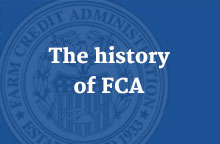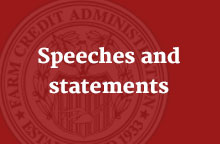Frequently Asked Questions
Click on a category below for FAQs on the respective topic. For frequently asked questions about YBS reporting, go to Frequently Asked Questions and Step-by-Step Instructions for Preparing the Young, Beginning, and Small Farmers and Ranchers Report (PDF).
General questions about FCA Risk identification Similar entity reporting Flood insurance Borrower rights Collateral evaluations Disclosure and reporting rule Governance changes in 2006 Risk-weighting HVCRE exposuresRisk-weighting HVCRE exposures
On Feb. 8, 2024, the Farm Credit Administration board adopted a final rule to amend its regulatory capital requirements for Farm Credit System (FCS or System) banks and associations. The final rule defines, and establishes a risk weight for, high-volatility commercial real estate (HVCRE) exposures. The final rule was published in the Federal Register at 89 FR 25117 on April 10, 2024, and will be codified in FCA regulations at part 628.
FCA’s objectives in adopting this final rule are the following:
- Define what we mean by an HVCRE exposure and establish a 150% risk weight for these exposures to reflect their increased risk characteristics
- Ensure continued comparability to the Basel framework and the rules of the federal banking regulatory agencies, with deviations where appropriate to accommodate the different regulatory, operational, and credit considerations of the System
The final rule is effective Jan. 1, 2025, but we extended the implementation date until Jan. 1, 2026, as we announced in an informational memorandum (PDF) on Oct. 16, 2024. For technical information about this rule, please contact one of the following at [email protected] or 703-883-4223 (TTY 703-883-4056):
- Ryan Leist, Associate Director, Finance and Capital Markets Team, Office of Regulatory Policy ([email protected])
- Xahra Pollard, Senior Policy Analyst, Office of Regulatory Policy ([email protected])
For legal information about the rule, please contact Jennifer Cohn, Assistant General Counsel, Office of General Counsel, at [email protected] or 703-883-4020 (TTY 703-883-4056).
We provide guidance on the rule in the HVCRE Final Rule Decision Tree (PDF), a visual guide to help you determine whether a loan qualifies as an HVCRE exposure. For more detailed guidance, see the following questions and answers.
How does the final rule define an HVCRE exposure?
The final rule defines an HVCRE exposure as a credit facility secured by land or improved real property that meets the following three criteria and does not meet any of the definition’s exclusions:
- The credit facility must primarily finance, have financed, or refinance the acquisition, development, or construction of real property. (More than 50% of the proposed use of loan funds must be for the acquisition, development, or construction of real property to satisfy this criterion.)
- The purpose of the credit facility must be to provide financing to acquire, develop, or improve such real property into income-producing property.
- The repayment of the credit facility must depend upon the future income or sales proceeds from, or refinancing of, such real property. (This criterion is met if any amount of repayment will come from future income or sales proceeds.)
What exposures are excluded from the HVCRE definition?
The following are excluded from the HVCRE exposure definition:
- Credit facilities financing the acquisition, development, or construction of one- to four-family residential properties. (For such residential property loans, the dwelling must represent at least 50% of the total appraised value of the collateral securing the loan, and the loan cannot be used solely to acquire undeveloped land or to finance improvements to land.)
- Loans for agricultural land. (This exclusion does not apply to agricultural loans for farm property construction or land development purposes.)
- Loans for existing income-producing properties that qualify as permanent financings. (Consistent with the underwriting criteria for permanent loans, cash flow generated by the real property must be sufficient to support the debt service and expenses of the property.)
- Loans for certain commercial real property projects. (The loan-to-value ratio must be less than or equal to the applicable maximums in the rule. Also, the borrower must contribute 15% of the capital before funds are advanced, and this capital is required to remain in the project until the loan is reclassified as a non-HVCRE exposure.)
- Loans originated for less than $500,000.
Are there exclusions for certain rural infrastructure exposures?
Yes. In addition to the above exclusions, certain rural infrastructure exposures will not be subject to the HVCRE risk weight because of their unique characteristics.
- Rural water and wastewater construction exposures not assigned a 50% or 75% risk weight are subject to a 100% risk weight. See Revised Bookletter 70: Revised capital treatment for certain water and wastewater exposures (PDF), which was published on July 9, 2024.
- Electric cooperative exposures that are not assigned a 20% or 50% risk weight are subject to a 100% risk weight. See Bookletter 53: Revised Regulatory Capital Treatment for Certain Electric Cooperatives, which was published on Feb. 12, 2007.
When may a loan be reclassified as a non-HVCRE exposure?
A loan may be reclassified as non-HVCRE when two conditions are met:
- The development or construction on the real property has been substantially completed.
- The cash flow generated by the property is sufficient to support the debt service and expenses on the property in accordance with the institution’s loan underwriting standards for permanent financings.
What further resources can I use to help determine whether a loan is an HVCRE exposure?
We have developed the HVCRE Final Rule Decision Tree (PDF) as a visual guide to help you determine whether a loan qualifies as an HVCRE exposure. For more specific information, see the following questions and answers.
-
Are loans that are made before the implementation date of the rule (Jan. 1, 2026) subject to the HVCRE risk-weighting requirements?
No. Only loans made after the implementation date of this rule are subject to the HVCRE risk-weighting requirements. However, if a loan made before the implementation date of the rule is modified after the implementation date — or if a project is altered in a manner that materially changes the underwriting of the credit facility (such as increases to the loan amount or changes to the size and scope of the project) — the loan must be treated as a new exposure and reevaluated to determine whether it is an HVCRE exposure.
[§ 628.2 Definitions — High-volatility commercial real estate (HVCRE) exposure, paragraph (3)]
-
Do loans originated for less than $500,000 need to be evaluated to determine whether they are HVCRE exposures?
No. The HVCRE rule excludes loans originated for less than $500,000 from the definition of HVCRE exposures. Therefore, institutions do not need to evaluate these loans as HVCRE exposures.
[§ 628.2, paragraph (2)(v)]
-
If a credit facility financing the construction of a new barn for an existing hog operation is to be repaid entirely from the existing hog operation, would the credit facility meet the definition of an HVCRE exposure during the construction period?
No. Since repayment of the construction credit facility is not at all dependent on the future income or sales proceeds of the real property being constructed, the credit facility would not meet the definition of an HVCRE exposure.
[§ 628.2, paragraph (1)(iii)]
-
If a credit facility financing the construction of a new facility for an existing dairy operation is to be repaid both from the income of the existing operation and the future income from the facility being constructed, would the credit facility meet the definition of an HVCRE exposure during the construction period?
Yes, provided the facility does not qualify for any of the HVCRE definition exclusions. Since repayment of the credit facility during the construction period is dependent (even partially) on future income from the facility being constructed, the credit facility would meet the definition of an HVCRE exposure. The HVCRE risk weight would apply only while the facility being financed is under construction. Once construction is complete and the cash flow generated by the property covers the debt service and expenses on the property in accordance with the System institution’s loan underwriting standards for permanent financings, the institution would be allowed to reclassify the HVCRE exposure to non-HVCRE.
[§ 628.2, paragraphs (1)(iii) and (6)(i) and (ii)]
-
If a construction project is financed using a single credit facility that covers both the construction and operational phases of the operation, how would the institution ensure that repayment during the construction phase comes solely from ongoing operations, therefore exempting the facility from the HVCRE definition?
When the credit facility is underwritten, the institution would need to document the expected source of the debt payment through the construction phase. If repayment during that phase depends on future income from the facility being constructed, the credit facility would be an HVCRE exposure, provided it does not qualify for an exclusion. When construction is substantially complete and cash flow generated from the project is sufficient to support the debt service and expenses of the real property, in accordance with the System institution’s loan underwriting criteria for permanent financings, the credit facility could be reclassified to non-HVCRE.
[§ 628.2, paragraphs (1)(iii) and (6)(i) and (ii)]
-
If a winery operation is refinanced for $5 million and $1 million of the cash-out refinancing will be used for property improvements, would the credit facility meet the definition of an HVCRE exposure? Repayment of the new loan will come from ongoing winery operations.
No. The first criterion of the HVCRE definition is that the credit facility must primarily finance or refinance the acquisition, development, or construction of real property. Because less than 50% of the loan funds would be used for the acquisition, development, or construction of real property, the credit facility would not meet the definition of HVCRE. In addition, the third criterion of the definition of HVCRE is not met because the credit facility does not depend on future income or sales proceeds for repayment.
[§ 628.2, paragraph (1)(i)]
-
If a credit facility finances the purchase of land and the installation of center pivot irrigation, would the installation of irrigation constitute land development, thereby disqualifying the credit facility from the agricultural land exclusion?
No. Central to the definition of HVCRE exposures is that they primarily finance, have financed, or refinance the acquisition, development, or construction of real property. Land development includes property improvements such as laying sewers or water pipes in preparation for the construction of new structures. Installing irrigation to prepare the land for use in crop production would not constitute land development; therefore, the credit facility would meet the definition of the agricultural land exclusion.
[§ 628.2, paragraph (2)(i)(C)]
-
If a credit facility finances the purchase of agricultural land and the demolition of an obsolete poultry barn, would the credit facility qualify for the agricultural land exclusion?
Yes. If the credit facility will not finance the construction of a new structure to replace the obsolete barn, then the credit facility would qualify for the agricultural land exclusion.
[Preamble to final rule in 89 FR 25122 — Agricultural Land Exclusion]
-
Would the construction of new livestock facilities (such as poultry barns) qualify for the agricultural land exclusion?
No. The agricultural land exclusion applies to “agricultural land,” as defined in § 619.9025 of FCA regulations, or to real estate used as an integral part of an aquatic operation. Section 619.9025 defines agricultural land as land “improved or unimproved which is devoted to or available for the production of crops and other products such as but not limited to fruits and timber or for the raising of livestock.” While the agricultural land exclusion would apply to, for example, loans for pastureland on which livestock graze, the exclusion would not apply to loans for farm property construction or land development purposes, even if that property is to be used to raise livestock.
[§ 628.2, (2)(i)(C)]
-
Would a development loan to replace older vines in a vineyard with new varietals qualify for the agricultural land exclusion?
Yes. The planting of vines qualifies as crop production, which would mean the loan meets the definition of “agricultural land” outlined in question 9 above and would be excluded from the definition of an HVCRE exposure.
[§ 628.2, (2)(i)(C)]
-
Would credit facilities to finance agricultural land in the path of development (land in transition) be exempt from the definition of HVCRE exposures under the agricultural land exclusion?
It depends. The agricultural land exclusion does not automatically exclude exposures to land in transition from the definition of HVCRE. These exposures would need to be evaluated against the three criteria of the HVCRE definition, as well as all exclusions, to determine whether they are HVCRE exposures. FCA reminds System institutions that this rule is a risk-weighting regulation only. System scope and eligibility authorities are contained in other provisions of our regulations and in the Farm Credit Act.
[§ 628.2]
-
What forms of capital can be contributed to a project to satisfy the 15% capital contribution requirement of the certain commercial real property projects exclusion?
Cash; unencumbered, readily marketable assets (for example, insured deposits and financial instruments); development expenses paid out of pocket; and contributed real property or improvements would count as forms of capital to satisfy the 15% capital contributions criterion. Please note that the value of any contributed real property must be reduced by the aggregate amount of any outstanding liens on the property when calculating the 15% capital contribution.
[§ 628.2, paragraph (2)(iv)(B)]
-
If capital is contributed to a project to meet the 15% capital requirement after an institution has advanced funds to the borrower, could the loan then be exempt from the definition of HVCRE under the commercial real property projects exclusion (assuming all other criteria of that exclusion are met)?
No. To meet the 15% contributed capital requirement of the commercial real property projects exclusion, capital contributions must be made before the institution advances loan funds.
[§ 628.2, paragraph (2)(iv)(C)]
-
Does capital not “directly related” to a project (for example, cross-collateralized real estate) qualify as contributed capital for the purpose of meeting the 15% capital contribution criterion for the commercial real property projects exclusion?
Yes. Other real property contributed to a project does not have to be directly related to the project to count as capital contributions for the purpose of the commercial real property projects exclusion. However, as noted above, the value of contributed real property must be reduced by the aggregate amount of any outstanding liens on the property when calculating the 15% capital contribution.
[§ 628.2, paragraph (2)(iv)(B)(4)]
-
Does a USDA guarantee on a loan impact its risk weight under the HVCRE rule?
Yes. The guaranteed portion of these loans will continue to receive a reduced risk weight in accordance with FCA’s capital rules and will not be subject to the 150% risk weight for HVCRE exposures. Under § 628.32 (a)(1)(i)(B), the portion of an exposure that is directly and unconditionally guaranteed by the U.S. government, its central bank, or a U.S. government agency is risk-weighted at 0%. Under § 628.32(a)(1)(ii), the portion of an exposure that is conditionally guaranteed by the U.S. government, its central bank, or a U.S. government agency is risk-weighted at 20%. The non-guaranteed portion of the loan is subject to evaluation as an HVCRE exposure. For example, if a $1 million loan meeting the definition of an HVCRE exposure has a conditional guarantee from the Farm Services Agency (where 90% of the loan is guaranteed), $900,000 would be risk-weighted at 20% and $100,000 would be risk-weighted at 150%.
[§ 628.32, paragraphs (a)(1)(i)(B) and (a)(1)(ii)]
-
Are purchased participation interests in projects during the construction phase subject to the HVCRE risk-weighting requirements?
Yes. If at the time the System institution purchases the participation interest, the credit facility meets the definition of an HVCRE exposure without qualifying for any of the exclusions, the purchased participation interest would be subject to the HVCRE risk weight.
[§ 628.2]



